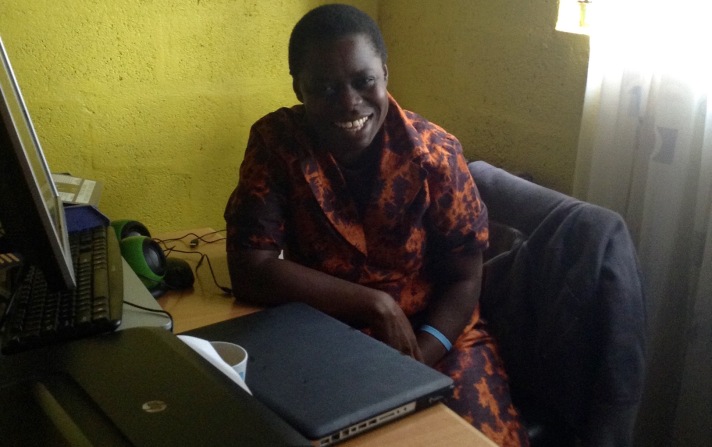Jane Anyango started providing sexual education to girls growing up in the informal settlements in Kibera in 2001 when her niece, who was only eleven years old, was involved in a case of sexual assault with a 39-year-old man. She decided to start bringing girls together and tell them about how to value and protect their bodies. Kibera slum has more informal than formal schools. These informal schools become the only accessible way through which children living in Kibera can attain education. The conditions of these schools, however, are dire. Jane explains that since most teachers in these schools are not trained teachers, there are many cases where teachers molest the girls and then caution them not to tell anyone. Below are the excerpts from the interview with Jane, a persistent and courageous fighter for the empowerment and liberation of girls and women in Kibera.
Who is Jane?
I am a normal Kibera woman. I moved to Kibera when I got married at twenty years old. I have very minimal education. My response to a need in this community is what turned into a registered Community Based Organization, Polycom Development project, which is now providing a safe space for girls and advocating for women’s concerns in Kibera. I started by meeting with the girls once a week to talk about their concerns and train them to be in charge of their bodies. I later started going to schools, campaigning against sex assault and imploring girls to protect their bodies.
What else have you done over the years?
When I learned of all the secret cases of sexual assaults that were going on in informal schools, I started going to the schools and requesting the directors to let me speak to their children. I began giving confidence-building services to the girls, encouraging them to decline their teachers’ sexual demands and to reach out to me when they needed help. My team and I also began a system of the “talking box”, where we provided boxes in these schools for students to anonymously put their thoughts and feelings in form of notes in these boxes. This was not only aimed at providing girls a safe space to air their concerns, but also to show them that they, as girls have the right to claim their voice and rights in our community, and not to be silenced. The challenge with the talking box, however, is that some teachers have relocated them to their offices and are forcing students to give their notes to them instead of putting them in the boxes.
We have another program named “G-pende,” which literalry translates to “Love yourself” in Swahili. We use sports—especially volleyball—to promote sports-womanship and self-empowerment. G-pende has also been a way to promote cohesion between tribes. You know Kenya is a very “tribalised” place, but when we come together to play and support out teams, we are just teams, not women who represent our tribes and ethnicities.
G-pende is also part of another project we started in the 2007 after the post-election violence where one of my girls was shot dead. The older women from Kibera joined me to advocate for peace through a separate organization of older women we registered under the name “Kibera Women for Peace and Fairness.” We printed T-Shirts and matched through the county preaching “oneness” and peace in Kibera. As many people lost their lives and a large number of kids were orphaned during the post-election violence, I also started to help some of the displaced kids whose parents were killed to find their families.
What is jane’s greatest inspiration?
Beside the fact that I have managed to impact these girls and even represent Kenya on bigger platforms, my girls recognize me on functions and the streets of Kibera. They call me “Maama yetu” which literally means “our mother.” That makes me feel like I am indeed making a difference in these girls’ lives.
And what are your greatest challenges?
I have found my lack of education a hindrance in certain areas. Like when I went to represent Kenyan women in the International Visitor Relations Program in the U.S., which convened 11 women from across Africa. Most of the women were educated and were at pa with the larger politics of their countries. How was I, a woman without substantive education in Kibera going to speak on behalf of Kenyans? There is a way the daily struggles of living in this slum disconnect you from the rest of the world. So even when I was invited to this conference, I felt so irrelevant because aside from the fact that I could not articulate myself well in English, all I had was a Kiberan perspective, instead of a Kenyan perspective that was expected of me. But I have been able to seize opportunities nevertheless, and made the most of them as far as helping my girls is concerned.
One project that I am now working on is The Urban Thinkers Campus toward the city we need, where city dwellers are supposed to develop a document and documentary planning their ideal city. It is flagged by the U.N., and Polycom Development Project is the only organization in Kenya that was chosen to host it. We will be championing the writing and planning of this document. I know it’s going to be challenging, but I am going to bring people on board and make sure that the concerns of women and girls are addressed in this document.
Also, the fact that I am solely working to ensure safety of the girl-child, it’s been hard to work in some schools where some teachers think my programs are “nosing into their school business.” Some teachers who molest kids make it hard for me to work in schools because I am a hindrance to them, so I have to work within the boundaries they avail me.
Note from the interviewers:
Jane wishes to hold longer G-Pende session, but she lacks the resources to facilitate these kinds of programs. Many of her girls also are not able to go past primary school education because of lack of tuition. You can find more information at www.polycomgirls.org. If you are interested in Jane’s cause, please reach her at Polycomdev@yahoo.com or +254 722 437 620
The interviewers are Tianhua Zhu and Hilda Betty Nalwanga, both current interns at AMWIK, and rising sophomore at Smith College.

